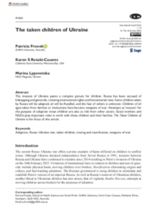Abstract
The invasion of Ukraine paints a complex picture for children. Russia has been accused of kidnapping and genocide, violating international rights and humanitarian laws. Some children taken by Russia will be adopted, all will be Russified, and the fate of others is unknown. Children of all ages taken from families or institutions have become weapons of war. Attempts at ‘rescues’ for the purpose of adoption mean children are also at risk from other actors. Social workers and NGOs play important roles in work with these children and their families. The Taken Children of Ukraine is the focus of this article.
Introduction
The current Russo–Ukraine war offers a prime example of harm inflicted on children in conflict zones. Although Ukraine declared independence from Soviet Russia in 1991, tensions between Russia and Ukraine have continued to escalate since 2014 resulting in Putin’s invasion of Ukraine on the 24th February 2022. Violations of international laws in relation to children and acts of genocide include physical harm, moving children over borders, Russification eliminating origins and culture, and fast-tracking adoptions. The Russian government is using children to intimidate and establish Putin’s version of an imperial Russia. As well as Russia’s removal of Ukrainian children, another threat to Ukrainian children has also arisen, that of vigilante Rambo Rescues, attempts at moving children across borders for the purposes of adoption.
This article focuses on The Taken Children of Ukraine during the first 6 months of the war and its implications for social workers engaged in work with children and their families. Information on taken children was collected in collaboration with Magnolia, a Ukrainian nongovernmental organization (NGO) and national hotline for missing children, from the first known report in February 2022. Information included in this research were reports from Magnolia, media investigations, official announcements from the governments of Ukraine and Russia including those on social media such as Telegram and translated using Google Translate, other reports and publications as they became available, and historical research on children taken in war. Ethical approval for this research was not required.

